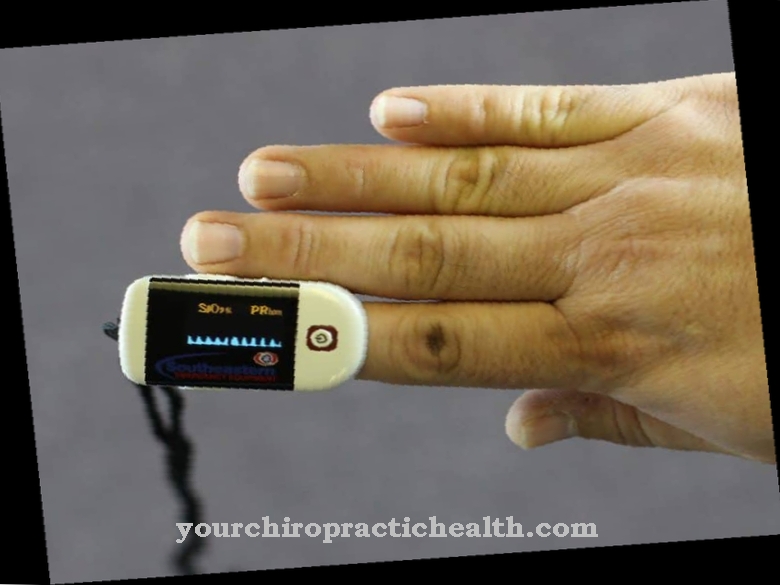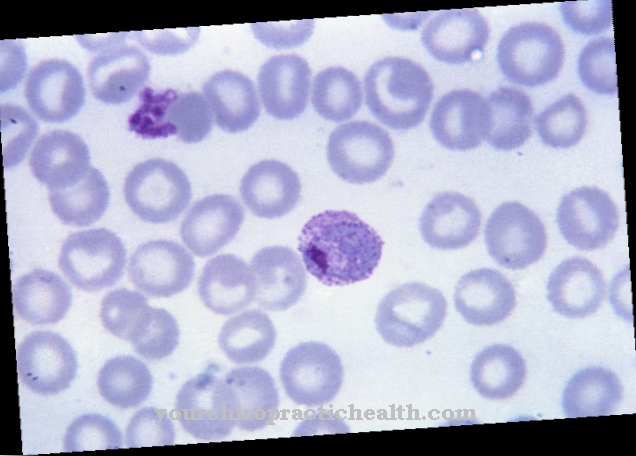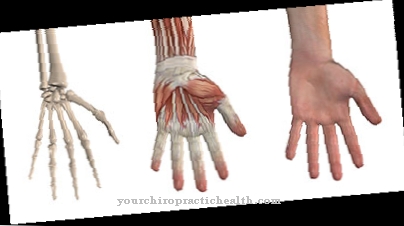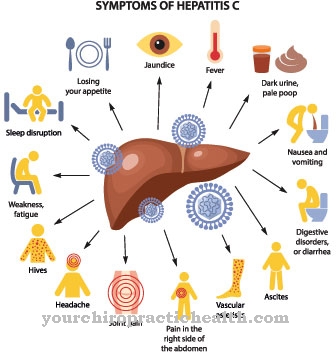Under Eye twitching, twitching eyelids or Eye twitching one understands an involuntary muscle twitching of the eyelid. Often such an eye twitch is harmless, but it can also indicate underlying diseases or deficiency symptoms or imbalances in the body.
What is eye twitch?

Many people have already experienced twitching of their eyes. Usually the upper eyelid twitches involuntarily and in quick succession. Such eye twitching does not have to be a sign of malfunction or illness.
Even in a healthy body, such nervous jerks occur every now and then. A mostly harmless eye twitching can occur for minutes or even hours. If eye twitching occurs for several days or longer, a doctor may be advisable; A neurologist is usually a suitable point of contact.
In contrast to nervous twitching, which can occur inside a healthy body, the affected person usually perceives twitching of the eyes more strongly because it can temporarily disrupt the field of vision.The twitching of the eyes is also visible to the outside.
causes
Eye twitching is mainly triggered by a muscle of the so-called upper eyelid, the eyelid lifter. This muscle receives signals through the nervous system. A common cause of eye twitching is, for example, physical or psychological stress or severe fatigue.
Other causes can also be hidden behind a twitch in the eye, and it is not always possible to clearly determine the cause. Too much sport and physical exertion can cause twitching of the eyes, because the overuse decreases nerve performance.
Irregularities in the body's mineral or water balance can also make the eyes twitch; If the body does not have enough of these substances, the communication between nerves and muscles (including the muscles of the eye) can be negatively affected.
Ultimately, however, eye twitching can also hide illnesses. Such diseases are, for example, viral infections; the body's strengths are here focused on fighting the virus.
Diseases with this symptom
- Malnutrition
- Mineral deficiency
- Drug addiction
- Diabetes mellitus
- Gluten- intolerance
- Chronic renal failure
Diagnosis & course
The course of eye twitching depends initially on whether it is a "healthy" eye twitch or an eye twitch with disease value; a harmless eye twitch usually ends after a few hours as suddenly as it occurred.
If illnesses are responsible for the eye twitching, the eye twitching usually depends on the course of the underlying disease. If a corresponding disease can be fought or defeated successfully, the twitching of the eyes usually also subsides or no longer occurs.
The diagnosis of an eye twitch itself can be made by a doctor without any problems, since the eye twitch can be observed. A diagnosis of the relevant background is often more difficult, as different causes often play together when the eyes are twitching.
Complications
The twitching of the eyes is harmless in most cases. Often only an uncontrolled twitching of the muscles is observed. The twitching of the eyes can also indicate various diseases and indicate deficiency symptoms in the body. Everyone has probably experienced the twitching of the eyes before, and the lid twitches in quick succession. Such nervous jerks also occur in completely healthy people; it is usually completely harmless and disappears on its own after a few minutes. However, if the twitching of the eyes lasts for several days, a doctor should be consulted. A neurologist would be the right place to go. The twitching of the eyes is perceived very strongly by those affected, but it is not at all bad for the other person.
Eye twitching is always triggered by a muscle on the eyelid, the so-called eyelid lifter. A common cause is fatigue or stress. Too much sport or physical strain are also often the trigger for the twitching of the eyes, because here the nerve performance is significantly impaired. If the body does not have enough water, nerves and muscles cannot communicate well with each other and the eyes twitch as well. However, if the twitching of the eyes occurs frequently, it could also be due to a viral disease, in which case a visit to the ophthalmologist is essential. However, the pathological twitching of the eyes can easily be treated, it either no longer occurs or it can only be observed very rarely.
When should you go to the doctor?
If the eyes twitch, a doctor should be consulted if the symptoms persist over a period of several days or are accompanied by symptoms such as headache, difficulty concentrating or temporary visual disturbances. A neurologist can rule out serious causes such as a malfunction in the brain, a tumor or nerve damage in the area of the eyes, the ophthalmologist can check the eyes for ametropia and injuries or inflammation and thus make a reliable diagnosis.
Otherwise, a doctor is recommended if the twitching of the eyes occurs as a result of a disease of the visual system or the brain, after alcohol or drug consumption or contact with caustic or irritating substances. In the case of existing underlying diseases such as celiac disease, chronic kidney disease or diabetes, which are often accompanied by twitching of the eyes during the course of the disease, it is advisable to see an ophthalmologist.
If, on the other hand, the twitching of the eyes occurs only irregularly, it is most likely a nervous twitching, which is triggered by stress or fatigue and returns by itself after a few days to weeks. A lack of minerals, malnutrition or eye strain from working in front of the screen are usually unproblematic - a doctor's visit is only necessary if the symptoms increase and the eye twitching reduces the quality of life or other symptoms occur that indicate a serious underlying disease.
Doctors & therapists in your area
Treatment & Therapy
Depending on the cause of the eye twitching, there are different methods to combat eye twitching. For example, if an eye twitch is caused by stress factors, relaxation procedures can lead to a decrease in the eye twitching. There are many different relaxation methods; In doing so, it is important to find out which relaxation method appears most pleasant and effective in each individual case. Relaxing massages can also have a positive effect.
Eye twitching can possibly also be alleviated by consciously eating: Above all, an adequate supply of magnesium is mentioned here by doctors, because magnesium is an important link between nerve signals and muscle reactions. If sufficient magnesium cannot be absorbed through food, it can be taken in the form of dietary supplements, for example.
Sufficient so-called trace elements (substances important for the body) can also play a role in fighting eye twitching. In addition, sufficient physical exercise (in a healthy amount) can have a positive effect on eye twitching.
If the twitching of the eyes is based on a certain disease, the first step in therapy is often to combat this disease.
Outlook & forecast
Occasional eye twitches can be found in a large part of the population. Simple causes such as overstimulation of the optic nerve or fatigue favor a good prognosis. After a deliberate rest period of a few hours or one or two days, the symptoms go away completely without further treatment.
However, if they persist, it makes sense to have them checked by your family doctor or eye doctor. Irritation of the cornea or even slight injuries from foreign bodies often go away completely after their removal. The same applies to the successful treatment of stress patients. An increased, psychological resilience reduces the physical manifestation in the body. There are also reliable therapeutic approaches against high blood pressure, which can provoke an overreaction of individual nerves.
However, the prospects are worse if there is a rapid drop in vision in deep-seated wounds, severe infections or even an ischemic stroke (cerebral infarction). If there is a suspicion of a serious background, quick trading is crucial for a good forecast.
Underlying diseases such as multiple sclerosis or an overactive thyroid can be reduced noticeably with medication. However, the risk of a relapse and the resulting eye twitching persist for a lifetime.
Given the variety of causes for eye twitching, a clear prognosis is only possible after a detailed examination by the specialist. In most cases, the symptom turns out to be bothersome and at the same time insignificant without any other side effects.
prevention
Some possible steps to prevent eye twitching are similar to corresponding therapy steps: Basically, a balanced lifestyle can often prevent eye twitching. For example, it can be helpful to avoid or reduce excessive stress. A rich diet is also a possible preventative factor. Such a lifestyle can also lower the risk of contracting infections, which can lead to eye twitching.
You can do that yourself
Those affected ideally counter stress-related eye twitching in everyday life with measures to reduce stress immediately. While changes in day-to-day work often cannot be implemented immediately, small measures are usually feasible in private everyday life. Reducing appointments and private commitments is helpful for many of those affected so that mind and body can relax.
Evenings are stressful for many people. Anyone who is tired and rushing from meeting to meeting cannot switch off. The consumption of social media and the permanent use of the smartphone also lead to a constant inner tension in some people, which can be reduced by consciously switching off the technology. Autogenic training, yoga and other mental relaxation exercises can usually be easily integrated into everyday life. They help to achieve more inner peace, which can have a positive effect on the twitching of the eyes. Those affected by eye twitching can also take supplements containing magnesium and vitamin B12. These vitamins and minerals can have a positive effect on the muscles by having a relaxing effect.
The twitching eye of those affected is often perceived much more intensely than by the outside world. But if you constantly fear that other people will notice the twitching of your eyes, you will become even more stressed. Here, an open approach to the problem can lead to more relaxation, which in turn should also have a positive effect on the twitching of the eyes.

























.jpg)


